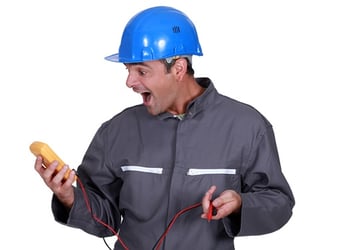 Hiring an electrical contractor for your major commercial installation isn’t something you do everyday. And choosing between contractors isn’t always easy.
Hiring an electrical contractor for your major commercial installation isn’t something you do everyday. And choosing between contractors isn’t always easy.
There may be pricing differences you have to take into consideration. And naturally, you’ll want to look at capability and experience. But sometimes there’s a more personal aspect involved in choosing the right commercial contractor—and it can come down to whether your potential contractor makes you feel nervous—or confident.
I’m not talking about personality traits. You don’t have to be best friends with your electrical contractor, but he or she should give you a sense of confidence that the work being done will be done safely and to the highest standards. Here are a couple of areas you can watch out for.
- How Does Your Prospective Contractor Talk to You? When describing the job that needs to be done, does your contractor explain it to you in terms that make sense to you (without talking down to you)? Does your contractor describe things to you in terms of achieving your goals? Do you end up confident that the work will be done correctly, or are you nervous because you’ve heard a bunch of technical mumbo jumbo that makes no sense to you?
- Does Your Potential Contractor Give You the Sense That He’s Been Down This Road a Time or Two? There is something very comforting about knowing that your contractor has experience doing what he’s about to undertake for you. Maybe it wasn’t the exact same specifications, but you don’t want a contractor scratching his head or saying, “Wow, we’ve never seen a project like this before!”
- Does Your Prospective Contractor Get Defensive When You Ask Questions? I understand that there can sometimes be a fine line between asking questions about the process and (ultimately) trusting your contractor to do the job. At some point, you do need to let the electricians do the work they are trained to do. But a contractor who is unwilling to field honest, pertinent questions simply doesn’t inspire confidence.
For more than 90 years we’ve dealt with thousands of clients—both in the residential and commercial sector—and we know how important it is to have confidence in a professional contractor. That’s why we encourage potential clients to review what our clients say about working with us—and how we won their confidence.






 Many residential (and some commercial) customers don’t realize that when they hire a general contractor to
Many residential (and some commercial) customers don’t realize that when they hire a general contractor to  Enthusiasm in business is a great attribute. It’s refreshing to come across a company with lots of energy and a “can do” spirit—until you realize (too late) that they really can’t do it because they simply don’t have the experience to tackle a complex job.
Enthusiasm in business is a great attribute. It’s refreshing to come across a company with lots of energy and a “can do” spirit—until you realize (too late) that they really can’t do it because they simply don’t have the experience to tackle a complex job. Most of the year,
Most of the year, 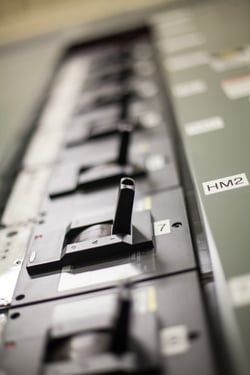 If your business has grown, or you have replaced old equipment with new, then you might already have outgrown your current commercial panel. Likewise, if your building was built in the 50’s, 60’s or 70’s, there is a good chance that your commercial panel might be using outdated technology.
If your business has grown, or you have replaced old equipment with new, then you might already have outgrown your current commercial panel. Likewise, if your building was built in the 50’s, 60’s or 70’s, there is a good chance that your commercial panel might be using outdated technology. When most people think of smoke alarms, they think of the battery operated alarm units installed in their homes. However, while those are certainly the most common type of smoke alarm, there are also hardwired smoke alarm options that are much better suited to commercial and industrial applications.
When most people think of smoke alarms, they think of the battery operated alarm units installed in their homes. However, while those are certainly the most common type of smoke alarm, there are also hardwired smoke alarm options that are much better suited to commercial and industrial applications.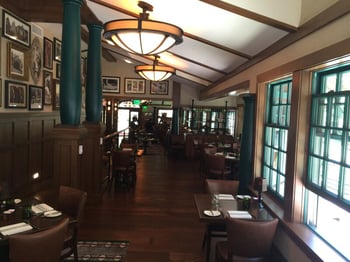 A full-service electrical contractor since 1921, Berwick Electric Co. has seen it all. From small wiring projects to large remodels, the aim of the company has always been to follow each project to completion using high performance standards, regardless of how challenging a job might seem.
A full-service electrical contractor since 1921, Berwick Electric Co. has seen it all. From small wiring projects to large remodels, the aim of the company has always been to follow each project to completion using high performance standards, regardless of how challenging a job might seem.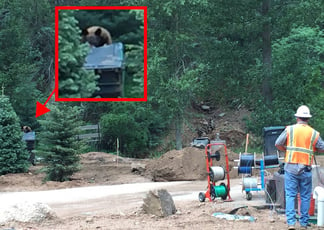 Aside from the difficult terrain and location, Berwick had to deal with two unexpected challenges: unseasonably cold weather and the occasional bear visit to the site. Midway through the project, a second flood damaged a lot of the work that had already been completed, which meant the crew had to work harder and faster to get things finished on time.
Aside from the difficult terrain and location, Berwick had to deal with two unexpected challenges: unseasonably cold weather and the occasional bear visit to the site. Midway through the project, a second flood damaged a lot of the work that had already been completed, which meant the crew had to work harder and faster to get things finished on time.  Hiring an electrical company for a major commercial installation isn’t something most people do every day. You’ll probably want to interview at least a couple of companies before you make your choice. And while you may have a number of electrical companies from which to choose, not all of them are created equal. How can you make sure you select the company that will deliver the solution you can depend on? Here are five questions you can ask to help you make your decision.
Hiring an electrical company for a major commercial installation isn’t something most people do every day. You’ll probably want to interview at least a couple of companies before you make your choice. And while you may have a number of electrical companies from which to choose, not all of them are created equal. How can you make sure you select the company that will deliver the solution you can depend on? Here are five questions you can ask to help you make your decision.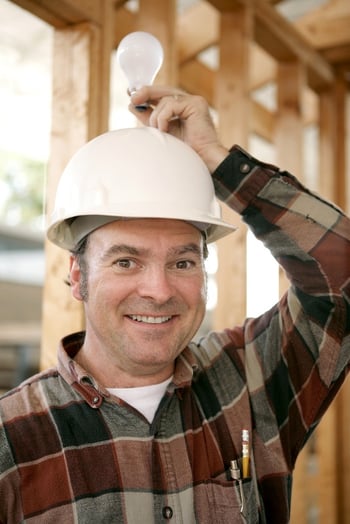 When Thomas Edison perfected the first commercially viable electric lightbulb in 1879, he probably had no idea that a couple of hundred years later, there would be so many variations on his idea. However, there have been many leaps and bounds in electric lighting since then, and there are hundreds of different types of lightbulb on the market today. Here is a brief outline of the most common types.
When Thomas Edison perfected the first commercially viable electric lightbulb in 1879, he probably had no idea that a couple of hundred years later, there would be so many variations on his idea. However, there have been many leaps and bounds in electric lighting since then, and there are hundreds of different types of lightbulb on the market today. Here is a brief outline of the most common types.